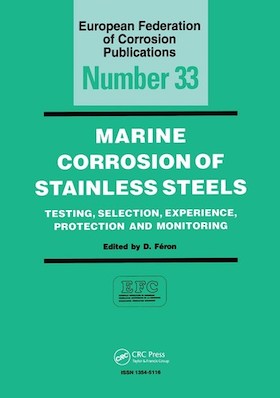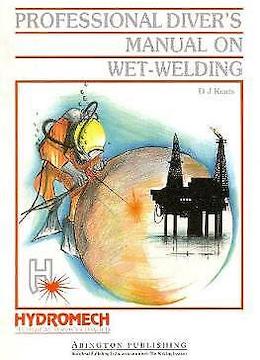
-----
Stainless steel pipe for sea water?
Q. I am a project engineer at the Utility Projects of a petrochemical complex in Turkey. We are working on a project about feeding the fire water system with sea water under emergency. There will be a 50 m pipeline from the sea to the pump suction collector. This line will be full of sea water at all times. There will be couple valves on the line. We plan to choose stainless steel type 304 material for the pipe, A312TP304. Would it be OK against sea water? What do you suggest?
Mustafa Inamli- Izmir, Turkey
2002
A. Stainless steel will corrode in seawater. The extent to which it will corrode and the speed of corrosion depends on many factors.
Good passivation after fabrication will help.
Avoiding close proximity to dissimilar metals will also help.
Electropolishing is better than simple passivation.
Avoiding an air/seawater interface in the piping is important so you should avoid the situation where the piping is partially filled for long periods.
Avoiding oxygen starvation in the piping is also important so if the pipe is to be left flooded at all times you should periodically change the water to avoid the situation where oxygen is depleted by bacterial action.
SS316 is better than 304. There are other stainless steel alloys that are even better such as AL6XN or Seacure but cost becomes a factor.
If other metal structures are nearby and immersed in seawater also, you should consider sacrificial zinc anodes. The design of such a protection system is more than I can help with in this public forum.
I hope these comments are of help.
Good luck with your project.
- Elkhorn, Wisconsin
A. Hi Mustafa!
May I recommend you use something that doesn't corrode!
You've got two viable alternatives. One is PVC, the other is HDPE.
Both would need concrete anti-flotation weights to hold them in place and to prevent movement in tidal surge, too. Both would cost far less than stainless.
I'm not too sure WHY you would want any valve on that line, certainly not two! An on/off one perhaps. But beware if that valve could be shut off or restrict the flow when the pump is operating!
You didn't mention the pipe diameter but I'd assume it would be well within the range of standard PVC pressure pipe whereas HD Polyethylene (fusion joining) pipe can be had on this continent up to 5 feet diameter!
If I had the choice I wouldn't use my favorite plastic, PVC but would select Polyethylene due to its flexibility and its more forgiving nature. May I also suggest you oversize your pipe leading to the pump connection as this would make the pump, under suction conditions, more efficient ... but as you are an engineer you've most likely realized that.
Lastly, should your line suck up any sand, HDPE is known in mining circles for its very good abrasion resistance in slurries... but sand would play hell with your pump!
Cheers !

Freeman Newton [dec.]
R.I.P. old friend (It is our sad duty to
advise that Freeman passed away 4/21/12)
Multiple threads merged: please forgive chronology errors and repetition 🙂
Seawater corrosion of type 304 stainless coolant piping
Q. We have experienced a problem with a customers coolant piping on offshore units. The cooling circulates fresh sea-water through a cooler to provide engine, fuel, and air cooling. The stainless steel piping has started to corrode and leak at the welded joints. 304 stainless was used for material in the piping and elbows. Is this a form of Galvanic corrosion?
R. Reder- Calgary, Alberta, Canada
2003
A. Hi !
You are not the first nor will you ever be anywhere like the last to have problems with stainless in salt water. It keeps and KEEPS coming up.
`
And you used a mere 304 series, tut, tut. Even 316 has problems. Go the archives and see, I think --
thread #71/17 and thread #197/60
Why in the HECK don't knowledgeable (?) engineers use the right damn plastics to avoid marine corrosion!

Freeman Newton [dec.]
R.I.P. old friend (It is our sad duty to
advise that Freeman passed away 4/21/12)
A. It sounds like it might be a welding problem. If you don't weld SS properly, you get carbide precipitation around the welds. You've then got some prime spots for corrosion. I was saw a customer's process tank almost literally fall apart because of bad welding. I'm no welding expert, but I have heard that 304 is not the greatest for welding. People usually recommend 316L.
Christian M. Restifo- Pittsburgh, Pennsylvania
Q. Hi
My name is Amir from Malaysia currently studying in the University of Manchester.
My question is: Which materials and grades is the most suitable for piping for a raw seawater pumping service in an offshore environment?
I have been looking into Copper-nickel alloy (Incoloy) but cost will be an issue because this alloy is very expensive. I have also looked into carbon steel and stainless steel as well.
Any opinions? Suggestions?
Thank you,
student - Manchester, England
January 30, 2008
A. Why such hard thinking of using the stainless steel. You have another option very suitable for the corrosion, will not happen at all, with the flexible design and for a long term period (less maintenance of course!). You may choose GRE [glass reinforced epoxy] pipe.
Siti Mazniza- Malaysia
SS304L Above Seawater Environment
Q. We want to construct a SS304L pipeline which is to receive sodium hydroxide solution from a ship to our plant site. Because of the above-sea environment (pipe is about 2 meters above sea level), it is a highly corrosive environment.
1. Can you advice me what is the expected chloride corrosion that the SS304L will be facing?
2. What is the most suitable protection for the SS304L pipe? We are thinking of epoxy coating. Is it suitable?
Thank you.
chemical industry - Jurong Island, Singapore
September 25, 2008
A. Hi Chan,
Yes, you will undoubtedly get corrosion of your stainless pipe particularly around the welds.
Yes, epoxy sounds OK but ensure that it is in a matrix of fibers, not just painted on.
Have you not considered uPVC for the pipe? Epoxy may be a good choice but what about a FRP laminate using a vinyl ester resin?
Cheers

Freeman Newton [dec.]
R.I.P. old friend (It is our sad duty to
advise that Freeman passed away 4/21/12)
Testing, Selection, Experience"

on eBay or Amazon
(affil link)
A. Dear Chan,
Why don't you use AISI 316L? This performs much better in marine applications regarding corrosion resistance and the cost remains reasonable.
Anyway, for the finish in marine applications I would use electropolished parts/pipes, both with 316 or 304.
This finish realises a much better corrosion resistance than only passivated parts.
Kind regards,.
- Brugge, Belgium, Europe
A. Hi Chan,
I'm with Marc.
Why use an inadequate material and then try to protect it, with on-going maintenance of the protection? Much better to start with a material that is suitable for the service environment. 304 would be a disaster. 316 would be borderline OK given your typical ambient temperatures in Singapore. 2205 would be excellent.

Bill Reynolds [deceased]
consultant metallurgist - Ballarat, Victoria, Australia
We sadly relate the news that Bill passed away on Jan. 29, 2010.
Q. For 25 bar pressure and ambient temp 45 °C PIPE SIZE 8"&10" IN SEA WATER SERVICE.
PIPES ARE IN STAGNANT CONDITION FOR FIRE WATER SYSTEM. What material suits for better resistance to corrosion?
Technology support - Chennai- India
February 26, 2010
A. We are manufacturer of Stainless Steel Pipes, generally we suggest customer using type 316L, it is better than type 304.
Ruth Fansteel company - Lishui, Zhejiang, China.
Q. Which pipe material is suitable for desalination plant?
1) There are four available types of piping materials: commercial steel, drawn copper, stainless steel and polyvinyl chloride. Select one and explain your choice.
none - JB malaysia
July 28, 2016
![]() Hi Kimberley. This appears to be a homework assignment.
Hi Kimberley. This appears to be a homework assignment.
I think the way this forum can best help your education would be for you to start by picking one, and then the readers can act as devil's advocates, allowing you to repetitively refine your answer until it's top notch!
Regards,

Ted Mooney, P.E. RET
Striving to live Aloha
finishing.com - Pine Beach, New Jersey
Ted is available for instant help
or longer-term assistance.
A. Kimberly,
My choice is pvc due to corrosion concerns as mentioned by OPs!

Blake Kneedler
Feather Hollow Eng. - Stockton, California
Q, A, or Comment on THIS thread -or- Start a NEW Thread

